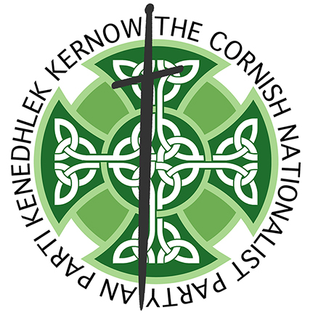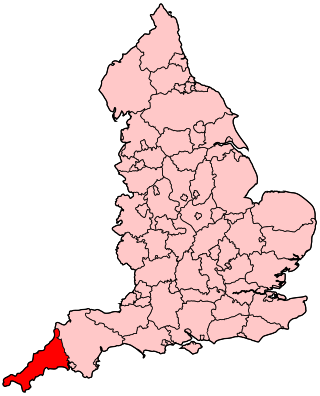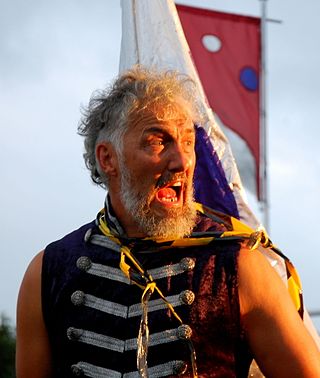Related Research Articles

The Cornish Nationalist Party is a political party founded in 1975. It initially campaigned for independence for Cornwall but later supported devolved powers under central UK control.
Cornish is a Southwestern Brittonic language of the Celtic language family. Along with Welsh and Breton, Cornish is descended from the Common Brittonic language spoken throughout much of Great Britain before the English language came to dominate. For centuries, until it was pushed westwards by English, it was the main language of Cornwall, maintaining close links with its sister language Breton, with which it was mutually intelligible, perhaps even as long as Cornish continued to be spoken as a vernacular. Cornish continued to function as a common community language in parts of Cornwall until the mid 18th century, and there is some evidence for traditional speakers of the language persisting into the 19th century.

Camborne is a town in Cornwall, England, United Kingdom. The population at the 2011 Census was 20,845. The northern edge of the parish includes a section of the South West Coast Path, Hell's Mouth and Deadman's Cove.
Kowethas an Yeth Kernewek is a Cornish language association which exists to promote, encourage and foster the use of the Cornish language.

The history of Cornwall goes back to the Paleolithic, but in this period Cornwall only had sporadic visits by groups of humans. Continuous occupation started around 10,000 years ago after the end of the last ice age. When recorded history started in the first century BCE, the spoken language was Common Brittonic, and that would develop into Southwestern Brittonic and then the Cornish language. Cornwall was part of the territory of the tribe of the Dumnonii that included modern-day Devon and parts of Somerset. After a period of Roman rule, Cornwall reverted to rule by independent Romano-British leaders and continued to have a close relationship with Brittany and Wales as well as southern Ireland, which neighboured across the Celtic Sea. After the collapse of Dumnonia, the remaining territory of Cornwall came into conflict with neighbouring Wessex.

Henry Jenner was a British scholar of the Celtic languages, a Cornish cultural activist, and the chief originator of the Cornish language revival.

Kenneth John George is a British oceanographer, poet, and linguist. He is noted as being the originator of Kernewek Kemmyn, an orthography for the revived Cornish language which he claims is more faithful to Middle Cornish phonology than its precursor,.

The Britons, also known as Celtic Britons or Ancient Britons, were the indigenous Celtic people who inhabited Great Britain from at least the British Iron Age until the High Middle Ages, at which point they diverged into the Welsh, Cornish, and Bretons. They spoke Common Brittonic, the ancestor of the modern Brittonic languages.
The Cornish people or Cornish are an ethnic group native to, or associated with Cornwall and a recognised national minority in the United Kingdom, which can trace its roots to the Brittonic Celtic ancient Britons who inhabited Great Britain from somewhere between the 11th and 7th centuries BC and inhabited Britain at the time of the Roman conquest. Many in Cornwall today continue to assert a distinct identity separate from or in addition to English or British identities. Cornish identity has also been adopted by some migrants into Cornwall, as well as by emigrant and descendant communities from Cornwall, the latter sometimes referred to as the Cornish diaspora. Although not included as a tick-box option in the UK census, the numbers of those writing in a Cornish ethnic and national identity are officially recognised and recorded.

Cornwall Council, known between 1889 and 2009 as Cornwall County Council, is the local authority which governs the non-metropolitan county of Cornwall in South West England. Since 2009 it has been a unitary authority, having taken over district-level functions when the county's districts were abolished. The non-metropolitan county of Cornwall is slightly smaller than the ceremonial county, which additionally includes the Isles of Scilly. The council has had a Conservative Party majority since the 2021 local elections. Its headquarters is Lys Kernow in Truro.

Michael Kenneth Paynter is a retired Cornish civil servant, trade union activist, and poet. Apart from a period of study at the University of Newcastle, he has lived in St Ives.
The Cornish dialect is a dialect of English spoken in Cornwall by Cornish people. Dialectal English spoken in Cornwall is to some extent influenced by Cornish grammar, and often includes words derived from the Cornish language. The Cornish language is a Celtic language of the Brythonic branch, as are the Welsh and Breton languages. In addition to the distinctive words and grammar, there are a variety of accents found within Cornwall from the north coast to that of the south coast and from east to west Cornwall. Typically, the accent is more divergent from Standard British English the further west through Cornwall one travels. The speech of the various parishes being to some extent different from the others was described by John T. Tregellas and Thomas Quiller Couch towards the end of the 19th century. Tregellas wrote of the differences as he understood them and Couch suggested the parliamentary constituency boundary between the East and West constituencies, from Crantock to Veryan, as roughly the border between eastern and western dialects. To this day, the towns of Bodmin and Lostwithiel as well as Bodmin Moor are considered the boundary.
Radyo an Gernewegva is a radio service broadcasting through the medium of the Cornish language both online, via podcast, and on several community radio stations in Cornwall, England, United Kingdom. It is a not-for-profit organisation, and receives some funding through the Cornish Language Partnership. It is produced by KernowPods.
Arthur Saxon Dennett Smith was a Cornish bard, writer and linguist, known by the bardic name Caradar. He taught Modern Languages at Blundell's School, Tiverton, Devon. He was born in Hurstpierpoint, Sussex, England, of Cornish parents, Harriet Annie and Arthur Smith, and became a collaborator with Robert Morton Nance and Henry Jenner on the Gerlyver noweth Kernewek ha Sawsnek. He compiled several grammars to make learning Cornish easier and edited some of the surviving Cornish texts. He also wrote an important series of books aimed at teaching Welsh to English speakers. In 1927, he married Dorothea Sophia Bazeley. He died in Worthing and is buried at Amberley, Sussex.
The Cornish language revival is an ongoing process to revive the use of the Cornish language of Cornwall, England. The Cornish language's disappearance began to hasten during the 13th century, but its decline began with the spread of Old English in the 5th and 6th centuries. The last reported person to have full knowledge of a traditional form of Cornish, John Davey, died in 1891. The revival movement started in the late 19th century as a result of antiquarian and academic interest in the language, which was already extinct, and also as a result of the Celtic revival movement. In 2009, UNESCO changed its classification of Cornish from "extinct" to "critically endangered", seen as a milestone for the revival of the language.
Rhisiart Tal-e-bot is a Welsh activist, Early Years lecturer who has been General Secretary of the Celtic League since 2006 and editor of Carn magazine since 2013. He is also the former president of the European Free Alliance Youth.
Movyans Skolyow Meythrin (MSM) is a not-for-profit organisation set up by Rhisiart Tal-e-bot, who is also its current director, since 2009. Based at Cornwall College in Camborne, it aims to spread the Cornish language among small children and their families.

The following outline is provided as an overview of and topical guide to Cornwall: Cornwall – ceremonial county and unitary authority area of England within the United Kingdom. Cornwall is a peninsula bordered to the north and west by the Celtic Sea, to the south by the English Channel, and to the east by the county of Devon, over the River Tamar. Cornwall is also a royal duchy of the United Kingdom. It has an estimated population of half a million and it has its own distinctive history and culture.

Will Coleman is a film-maker, author, musician and educational consultant. Coleman is a former director and musician with Kneehigh Theatre and founder and director of Golden Tree Productions, an organisation that develops cultural projects that promote Cornwall and its history.
Presented below is an alphabetical index of articles related to Cornwall:
References
- 1 2 Blyth, C. (2023). 'Other' Voices in Education—(Re)Stor(y)ing Stories: Stories as Analytical Tool. SpringerBriefs in Education. Springer Nature Singapore. p. 34. ISBN 978-981-99-5495-7 . Retrieved 18 June 2024.
- ↑ Jones, M.C. (1998). Language Obsolescence and Revitalization: Linguistic Change in Two Sociolinguistically Contrasting Welsh Communities. Oxford studies in language contact. Clarendon Press. p. 344. ISBN 978-0-19-823711-2 . Retrieved 18 June 2024.
- 1 2 Ball, M.J.; Muller, N. (2012). The Celtic Languages. Routledge Language Family Series. Taylor & Francis. p. 650. ISBN 978-1-136-85472-9 . Retrieved 18 June 2024.
- ↑ Murdoch, B. (1993). Cornish Literature. D.S. Brewer. p. 146. ISBN 978-0-85991-364-5 . Retrieved 18 June 2024.
- ↑ Judge, A. (2007). Linguistic Policies and the Survival of Regional Languages in France and Britain. Palgrave Studies in Minority Languages and Communities. Palgrave Macmillan UK. p. 180. ISBN 978-0-230-28617-7 . Retrieved 18 June 2024.
- ↑ Institute of Linguists (Great Britain) (1986). The Linguist: Journal of the Institute of Linguists. The Institute. Retrieved 18 June 2024.
- 1 2 "Teaching the very young to speak Cornish". West Briton and Royal Cornwall Gazette. 26 February 1981. Retrieved 18 June 2024.
- ↑ Coppen, Roger (22 June 1989). "Living Language". Country Life. Retrieved 18 June 2024.
- ↑ Footitt, Janet (27 April 1981). "Learning Cornish in the Cradle". West Briton Argus. Retrieved 18 June 2024.
- ↑ "Learning to Read - in Cornish". West Briton and Royal Cornwall Gazette. 25 June 1981. Retrieved 18 June 2024.
- ↑ "Trophy for Playgroup". West Briton and Royal Cornwall Gazette. 15 October 1981. Retrieved 18 June 2024.
- ↑ "Celtic Festival". West Briton and Royal Cornish Gazette. 22 April 1982. Retrieved 18 June 2024.
- ↑ "Cornish on Tape". West Briton and Royal Cornish Gazette. 22 July 1982. Retrieved 18 June 2024.
- ↑ "Cornish - on a computer". West Briton and Cornwall Advertiser. 18 February 1985. Retrieved 18 June 2024.
- 1 2 3 Hut, Arjan (2001). The Cornish language in education in the UK (PDF). Mercator-Education. Retrieved 22 June 2024.
- ↑ "Mayor defends site of Gorsedd event". West Briton and Cornwall Advertiser. 6 September 1990. Retrieved 18 June 2024.
- ↑ Ferdinand, Siarl (2013). "A Brief History of the Cornish Language, its Revival and its Current Status". E-Keltoi: Journal of Interdisciplinary Celtic Studies. 2. Retrieved 22 June 2024.